Pregnancy is the one time in your life when you will get advice from every one, friends, family, coworkers and even that random woman in the grocery store.
You probably already know about the things you should do during pregnancy such as ensuring a healthy diet including adequate folic intake and prenatal checkups.
But there are other precautions in early pregnancy that you should be aware of. Avoiding certain foods and lifestyle behaviours can greatly reduce your risk of miscarriage,
It’s hard to sort out the facts from the old wives tales when it comes to pregnancy but as a guideline, the 7 things below are worth considering.
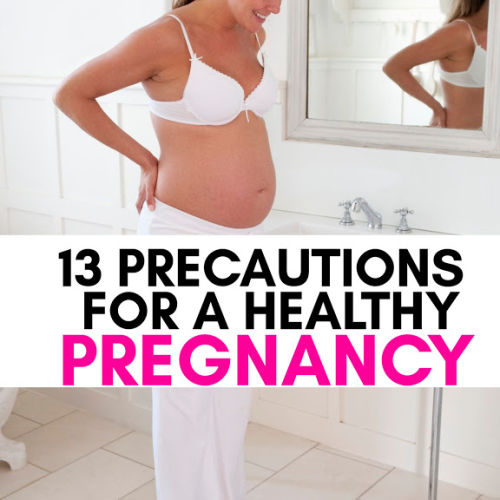
This post contains affiliate links, please read my Disclosure Policy for more information.
Related Posts
5 Sciatica Pregnancy Stretches To Ease The Pain
12 Amazing Prenatal YouTube Workouts Under 15 Minutes
7 Things Every Woman Should Do In Pregnancy
1. Eat Well

Make sure to eat plenty of nutritious foods throughout your pregnancy. The saying “you are what you eat” has never been so apt when it comes to providing nutrients for your developing baby.
Make sure your diet includes fruit, vegetables and protein which is essential for cell growth. It can be hard in the early days of pregnancy to keep food down so if you can only stomach carbs, try and squeeze in an apple or two as well. (I actually found that sour green apples were wonderful for my morning sickness!)
2. Take A Prenatal Vitamin
Even if you are eating well, pregnancy is one of the times where you really do need to take a supplement as well. Prenatal vitamins are multi-vitamins with added folic acid and iron which are essential for pregnancy.
You can also ask your doctor about adding in a fish oil capsule or taking a prenatal with DHA.
3. Get Prenatal Care
This is the biggest precaution in pregnancy that you must take. A 2002 report showed a 40% increase in newborn deaths in mother’s who did not have regular prenatal care (OBGYN appointments, scans and bloodwork).
One important test is the step B test which is done towards the end of your pregnancy. If you test positive, you will be given antibiotics during labour to avoid a life-threatening infection.
4. Drink Water

Fluid needs increase in pregnancy to 10 cups/day due to your growing body.
You will likely find that you want to drink more water naturally but make sure to be drinking water rather than caffeinated drinks or soda.
5. Sleep Differently
This might not apply to you but most women have difficulty sleeping in pregnancy, partly because you can no longer sleep on your stomach or back.
It is also recommended that you sleep on your left side where possible as that position offers optimal blood supply to your baby.
If you are having trouble sleeping, consider getting a Pregnancy Pillow that helps get your body in a comfortable position all night. Use promo code STRIVE50 for 50% your pillow at pregnancypillow.com

6. Use herbs and essential oils with caution

Essential oils and herbs are all the rage but you do need to proceed with caution in pregnancy.
Please do speak to your doctor before using any natural remedies or essential oils during pregnancy.
Not all essential oils are safe for pregnant women and some can have devastating effects. Essential oils to avoid include yarrow, fennel, myrrh and many more.
The same goes for herbal teas which are not all safe for pregnant women – here is a list of the best and worst teas in pregnancy.
7. Manage your weight gain
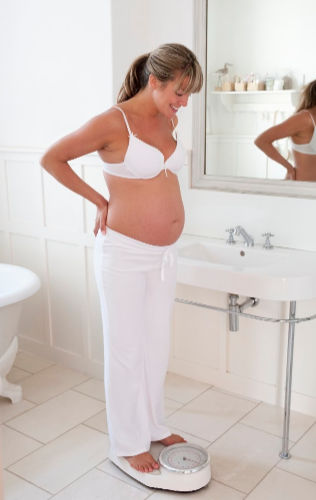
Unfortunately, you are not actually eating for two. Sorry! According to this prenatal checklist from Sunnybrook Health Sciences “during the 1st trimester no extra calories are required; nonetheless healthy food choices are paramount”
During the 2nd and 3rd trimesters you do need to increase your calorie intake slightly.
According to Canada’s Food Guide, a diet during pregnancy should contain 2200-2400 kcal/day, comprised of: Milk and milk products 3-4 servings/day Breads and cereals ≥ 5 servings/day Fruits and vegetables ≥ 5 servings/day Meat, fish, poultry and alternatives 2 servings/day
And 6 Things To Avoid In Pregnancy
Below are 6 precautions in pregnancy that every woman should follow.
I’ve linked to studies where possible so you can view medical research instead of relying on rumours and speculation.
1. Eating too much seafood

Fish is generally healthy and packed with Omega 3 vitamins that are essential for your baby’s brain development.
The concern with seafood is the mercury levels especially in some fish.
In the US, the Food and Drug Administration (FDA), the Environmental Protection Agency (EPA) and the 2015-2020 Dietary Guidelines for Americans recommend that pregnant women eat at least 8 ounces and up to 12 ounces (340 grams) of lower mercury seafood a week.
Fish that are safer to eat include:
Salmon
Anchovies
Shrimp
Sardines
Trout
Atlantic and Pacific mackerel
Catfish
Canned light tuna
Cod
Shark and swordfish are two examples of fish to avoid, due to their higher mercury content. Tuna in general should be limited to one portion a week.
2. Exercising heavily
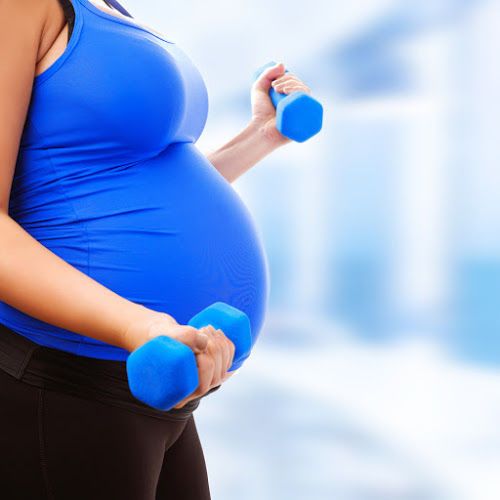
This is especially important if you were not very active before getting pregnant.
If this is the case, start exercising slowly. Even just beginning a regular walking program can improve your endurance before the birth of your baby.
If you are more conditioned and you exercised prior to pregnancy, you will likely be able to continue your exercise routine.
However, you will want to avoid high-impact exercises, contact sports, and other sports/activities where there is a risk of falling.
Weight lifting is generally safe in a low-risk pregnancy, but you do not want to be lifting too much weight and straining.
One way to exercise safely during pregnancy is to do prenatal YouTube workouts at home.
You never want to exercise to the point of exhaustion or overheating, as this can be dangerous for your baby.
Always check with your physician before beginning or continuing any exercise program, as there are times when exercise is not recommended during pregnancy.
3. Don’t sit in a hot tub or sauna

Increased body temperature or hyperthermia may cause miscarriage in early pregnancy.
Research from 2003 show that regular hot tub or sauna use during pregnancy may result in a twofold increased risk of miscarriage.
The study only involved 103 women but the results show that there seems to be a clear link between a raised boy temperature and early pregnancy loss.
If you do wish to take a bath during pregnancy, make sure to keep the water warm but not hot. In a bath the water temperature falls quite quickly so they are not as bad as a hot tub where the water is kept hot.
4. Smoking or breathing in second-hand smoke

Tobacco smoke increases the chances of having a low-birth weight infant, one who is at increased risk of dying from SIDS (Sudden Infant Death Syndrome), and other medical complications for both the mother and baby.
Aside from not smoking yourself, you should avoid being around smokers and breathing in second-hand smoke.
Studies have shown that second-hand smoke exposure of pregnant women may be significantly associated with early preterm delivery.
5. Drinking Alcohol

Alcohol is the only cause of Fetal Alcohol Spectrum Disorder, a completely preventable disorder and avoid it is one of the most important precautions to take in pregnancy.
Children exposed to alcohol in utero can have a wide range of disorders ranging from identifiable facial features to less obvious, but serious, learning disabilities and impairments in reasoning, to name a few.
Most doctors will concede that one small drink occasionally during pregnancy will not hurt but be careful not to overdo it as the effects can be devastating.
One precaution in early pregnancy that you can sort of relax about is if you had a drink before you realized you were pregnant (before 4 weeks).
While you want to be careful to avoid drinking in early pregnancy, most doctors agree that drinking in early pregnancy has an all or nothing effect. If your pregnancy is still progressing normally, no harm was likely done.
This is because mother and child do not share a blood supply until 4 weeks.
This article from Duke University explains exactly how alcohol passes from mother to child.
6. Certain Common Medications
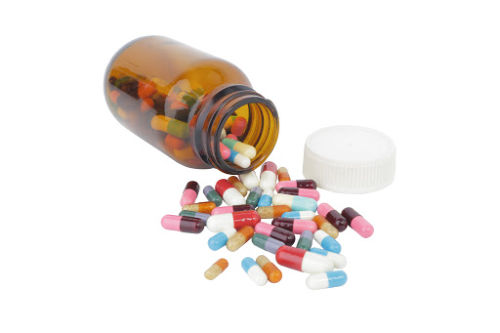
If you get a headache while pregnant, you might be tempted to reach for the Advil or ibuprofen.
In fact pregnant women should avoid common pain relievers such as aspirin and ibuprofen as they may increase the risk of miscarriage.
Tylenol (acetaminophen) is recommended if you do need to take something but make sure to only use it occasionally.
If you are suffering with backache or painful sciatica, here are 8 ways to naturally ease sciatica in pregnancy that may help you avoid painkillers completely.
Make sure to consult with your doctor before taking any medications during pregnancy.
More Precautions in Pregnancy To Follow
If you want to see what else is safe or unsafe in pregnancy, I highly recommend this free PDF from the Government of Manitoba in Canada. I came across it while researching this post and found it really useful.
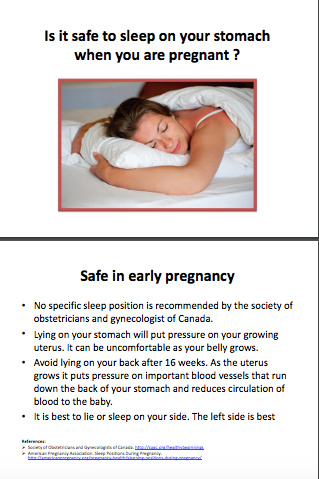
It goes through common lifestyle behaviours such as dying your hair, getting a tattoo etc and tells you clearly whether it is a safe activity to do in pregnancy or not.
More Pregnancy Tips
12 Amazing Prenatal YouTube Workouts Under 15 Minutes
5 Sciatica Pregnancy Stretches To Ease The Pain
Like this post? Pin it!



Leave a Reply